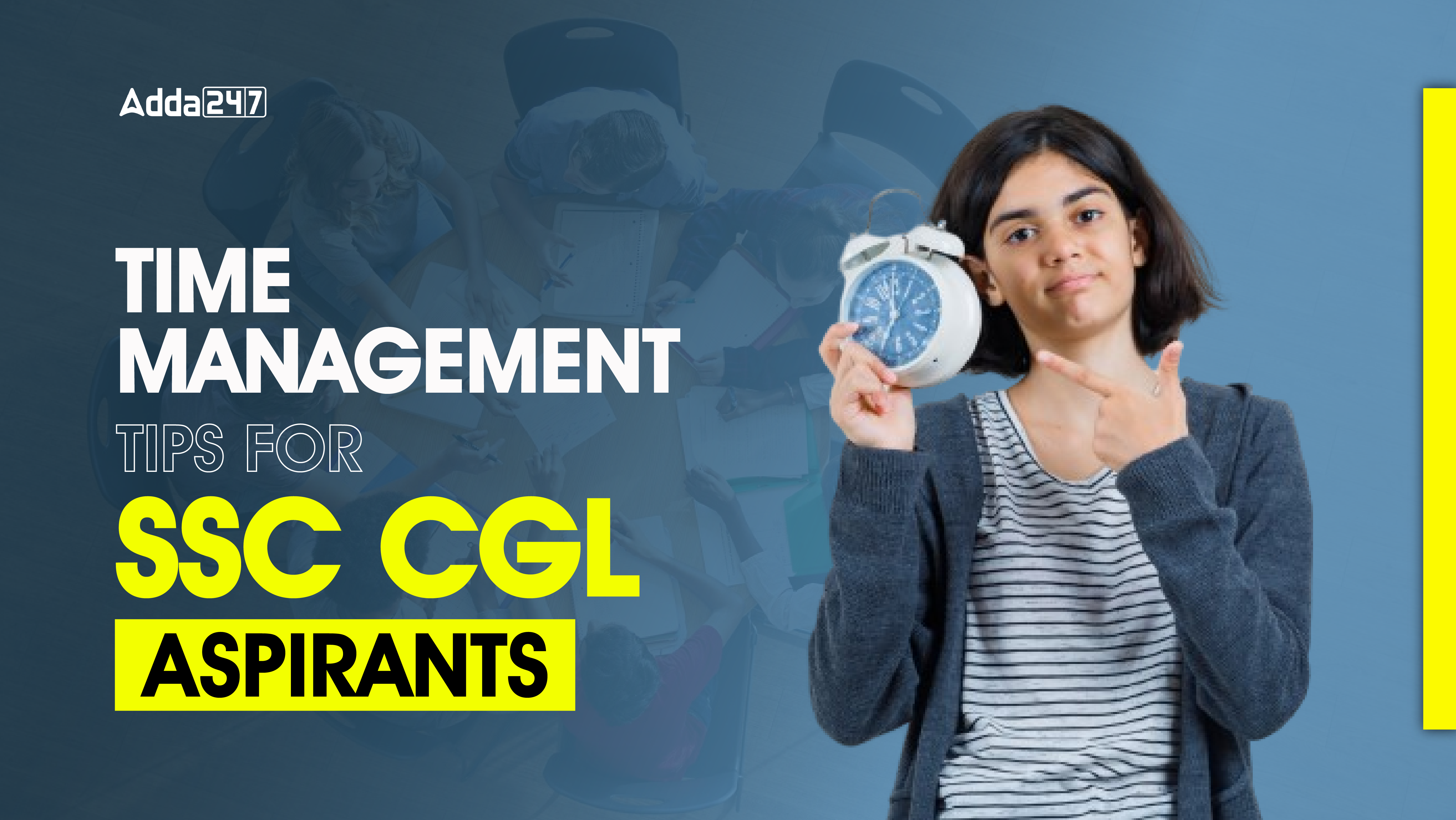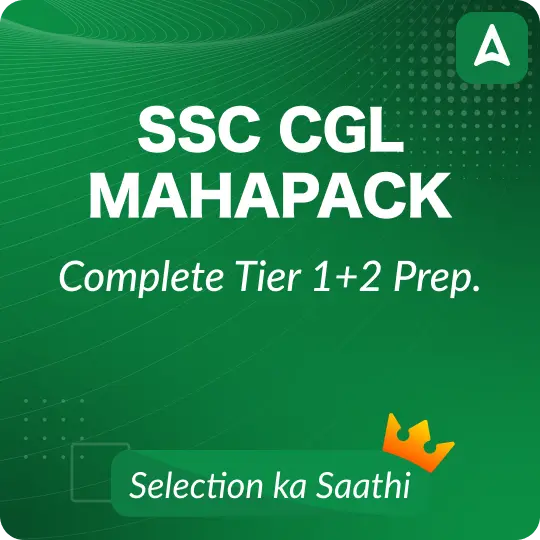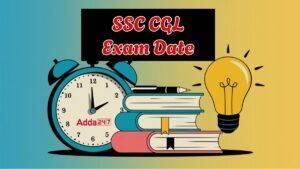Table of Contents
The Staff Selection Commission (SSC) is going to conduct the Combined Graduate Level Examination 2024 from 9th September to 26th September 2024, for 17,727 vacancies. Candidates preparing for this exam often face time-related challenges during the exam and in their preparation period too. With only few days left for the examination, effective time management becomes crucial for aspirants in the final few days. This article provide valuable time management tips to help SSC CGL 2024 aspirants to enhance their preparation and performance.
There are typically two types of SSC CGL aspirants: those who are working and those who are full-time students or dedicated solely to exam preparation. Regardless of their situation, all candidates must use their time wisely. Without proper time management, even significant effort may not give the expected results.
Section-Wise Time Management Tips for SSC CGL 2024
SSC CGL Tier 1 consist of 4 Sections namely General Intelligence & Reasoning, Quantitative Aptitude, English Language & Comprehension and General Awareness. Let’s check out the time management tips for each section separately.
General Intelligence & Reasoning (25 questions, 2 marks each)
- This is the most scoring section of the Examination.
- This section needs more attention as the questions are the trickiest to solve.
- Try to solve this section in 15-20 minutes.
- If you are stuck on any question, leave it and come back after finishing the other sections.
- For preparation, practice 2 sectional mock papers; this will increase your speed and accuracy.
- Analyze the mock tests thoroughly, and prepare separately for topics in which you are facing difficulties.
- Try to solve questions in 30 seconds to 1 minute; don’t spend more time on any question.
Quantitative Aptitude (25 questions, 2 marks each)
- The Quantitative Aptitude section may be the most difficult and time-consuming section among all the sections of the Tier I paper.
- Try to solve this section last so you don’t panic in the exam.
- Sometimes lengthy & calculative arithmetic questions are asked.
- For speedy calculations in this section, memorize squares, cubes, Pythagorean triplets, percentage-to-fraction conversions, and advanced formulae.
- Use concepts like digital sum and divisibility rules.
- Don’t invest more time on any question; try to attempt 20+ questions.
General Awareness (25 questions, 2 marks each)
- This section has the most vast syllabus.
- Attempting 18+ questions in this section is considered a good score.
- For preparation, practice more and more previous year questions.
- Prepare important topics which are frequently asked by SSC.
- Don’t spend more than 7 to 8 minutes on this section as a whole.
- Use the elimination technique for answering questions in which you are confused between two options.
- Avoid pure guesswork; if you don’t have any idea about a question, leave it.
- Making a guess could lead to negative marking in exams, which will affect your other sections too.
English Comprehension & Language (25 questions, 2 marks each)
- This section will give you an edge over other aspirants.
- This section encompasses basic skills in English Language Comprehension, Vocabulary, and Grammar.
- To score well in this section, a candidate should have a great hold on vocabulary and reading comprehension.
- For vocabulary preparation, try to memorize antonyms, synonyms, one-word substitutions, idioms, and phrases from previous year papers conducted by SSC.
- Try to solve the reading comprehension part first.
- After reading one passage or one cloze test, you can attempt 5 questions according to the pattern followed by SSC in previous year examinations.
- After reading comprehension, approach vocabulary and grammar parts.
- Don’t spend more than 10 minutes on this section.
Time Management Tips for Full-Time Aspirants
Full-time aspirants have more flexibility but face the challenge of maintaining focus and avoiding burnout. They should create a structured study schedule that covers all subjects systematically while allowing for regular breaks and revision.
Create a structured daily routine: Set a daily schedule for study, sleep, and breaks. Divide your day among different subjects, giving more time to tougher areas. Treat your preparation like a full-time job.
Set and track goals: Each morning, write down what you want to achieve that day. For example, “Learn 2 new topics in General Awareness” or “Practice 2 math quizzes.” Make sure you’re covering all subjects. Focus on finishing topics, not just studying for a certain number of hours. Take practice tests to see how you’re improving.
Stay organized and use resources wisely: keep your study material well organized and use online resources well like use smartphone for taking online classes and maintain distance from social media, join online study groups where you can track your preparation with your fellow competitors use online platform for mock tests.
Balance study with Physical & Mental fitness: Include time for exercise, meditation, and relaxation. Join study groups occasionally for motivation. Remember, a healthy mind resides in a healthy body.
Time Management Tips for Working Aspirants
For working aspirants, balancing job responsibilities with exam preparation requires careful planning. They need to make the most of their available study hours, using evenings, early mornings, and weekends effectively. Working aspirants always remember that full time time aspirant are having edge on them because they have more time than you. so have to work more smartly to be in race.
Time Management and Prioritization: Your schedule should be to wake up early in the morning and study or study late nights. If you think you can study immediately after coming back from work, it will be very challenging due to lack of concentration and fatigue.
Utilize Weekends and Set Targets: Set weekly target as compare to daily targets because in job there may be some hectic days and you have to work late nights. Weekends are boon for working aspirants utilize them fullest to complete your set targets.
Use Travel Time efficiently: For example, if you travel by bus, use that time to listen to topic explanations or watch current affairs videos. Remember, nothing will happen without effort.
Remember Consistency is key. Stick to your schedule, there may be days when your schedule get break but don’t regret, start again on next day be on track as soon as possible. With disciplined time management, you can make significant progress in your SSC CGL preparation. Both groups of aspirants should prioritize their weaker areas, take regular mock tests to improve speed and accuracy, and ensure they cover the entire syllabus before the exam.




 Free Study Material for SSC CGL 2025, Do...
Free Study Material for SSC CGL 2025, Do...
 SSC CGL Exam Date 2025, Complete Exam Sc...
SSC CGL Exam Date 2025, Complete Exam Sc...
 SSC CGL Cut Off 2025, Check Post- Wise C...
SSC CGL Cut Off 2025, Check Post- Wise C...


